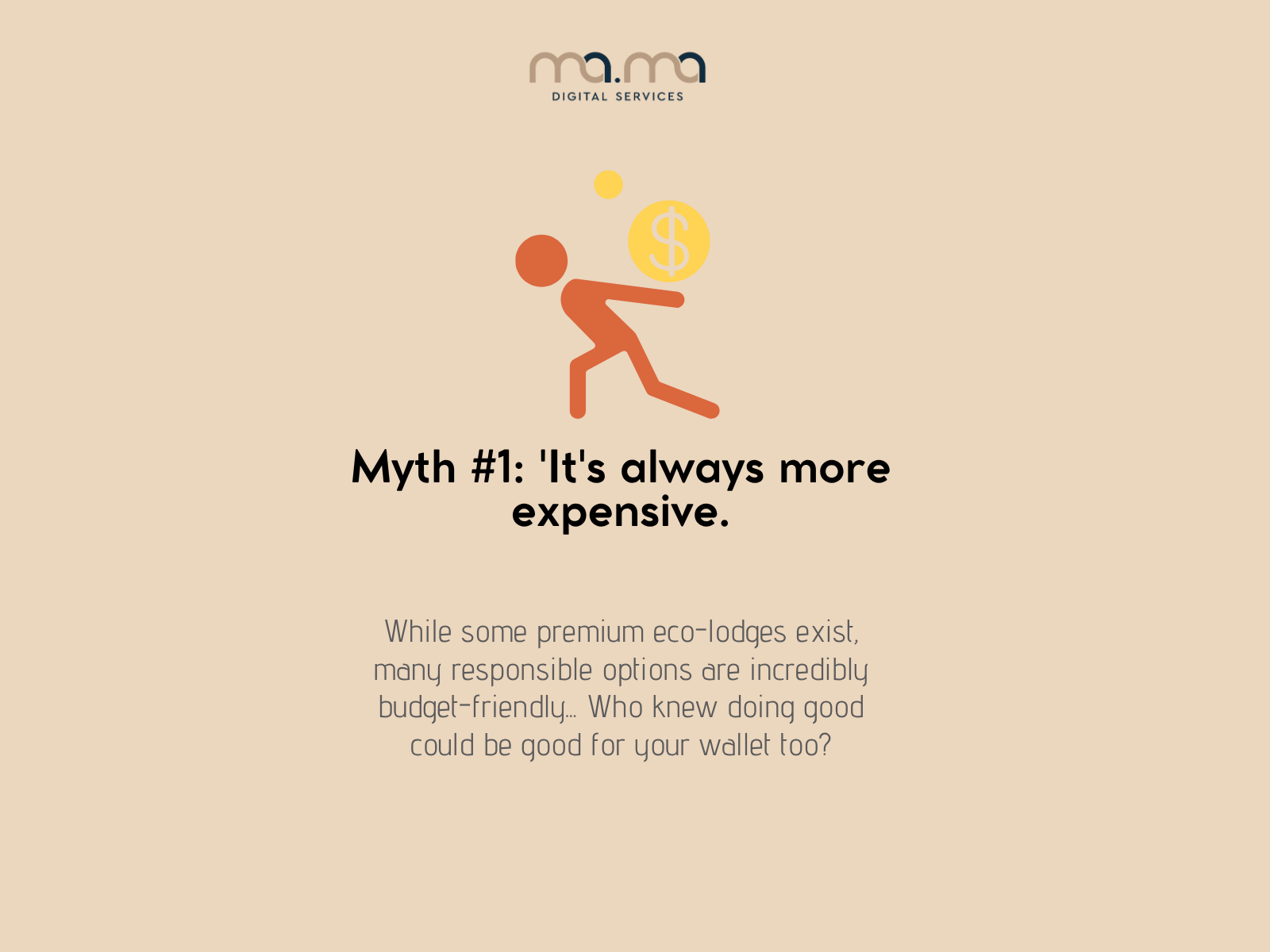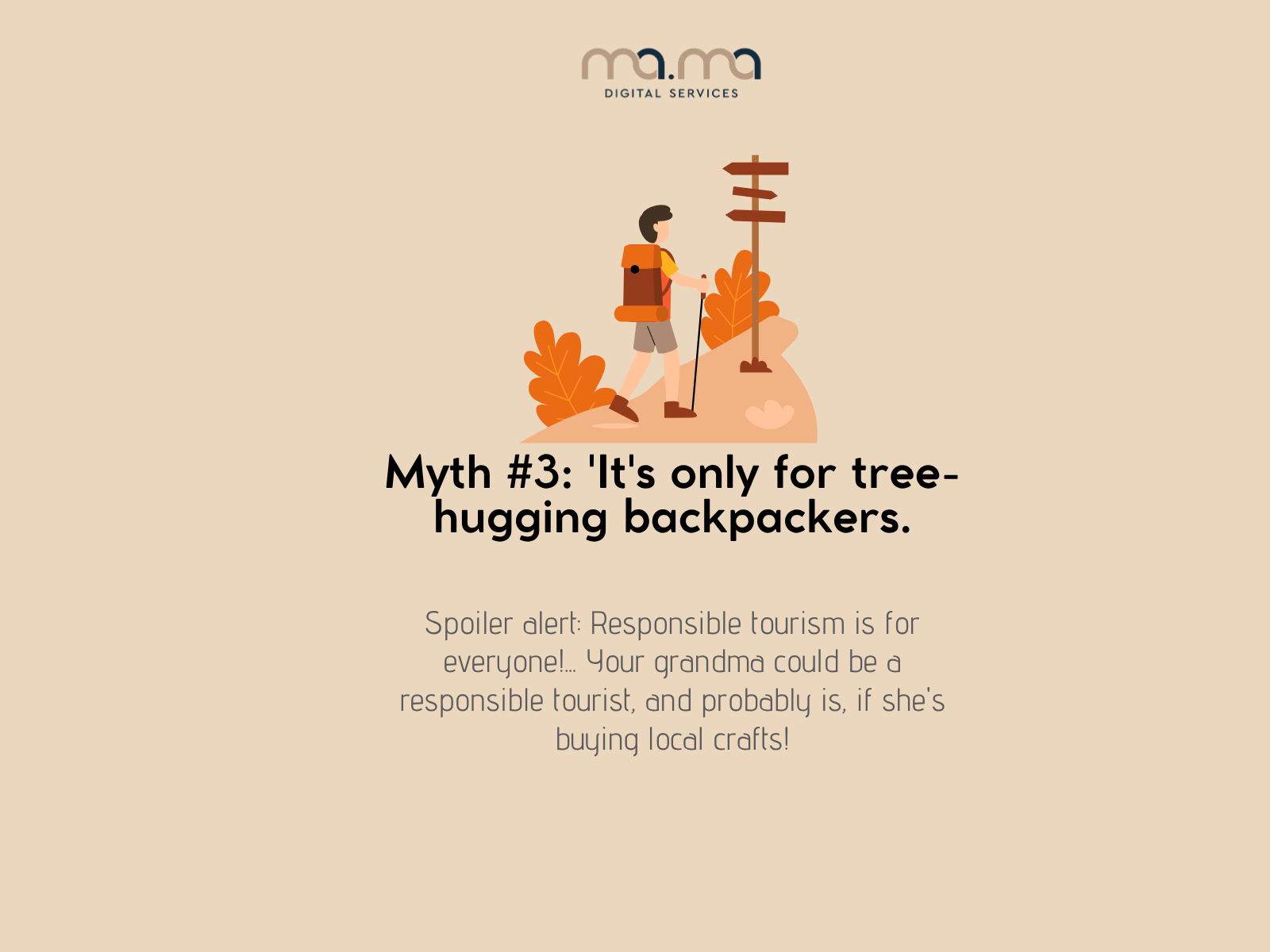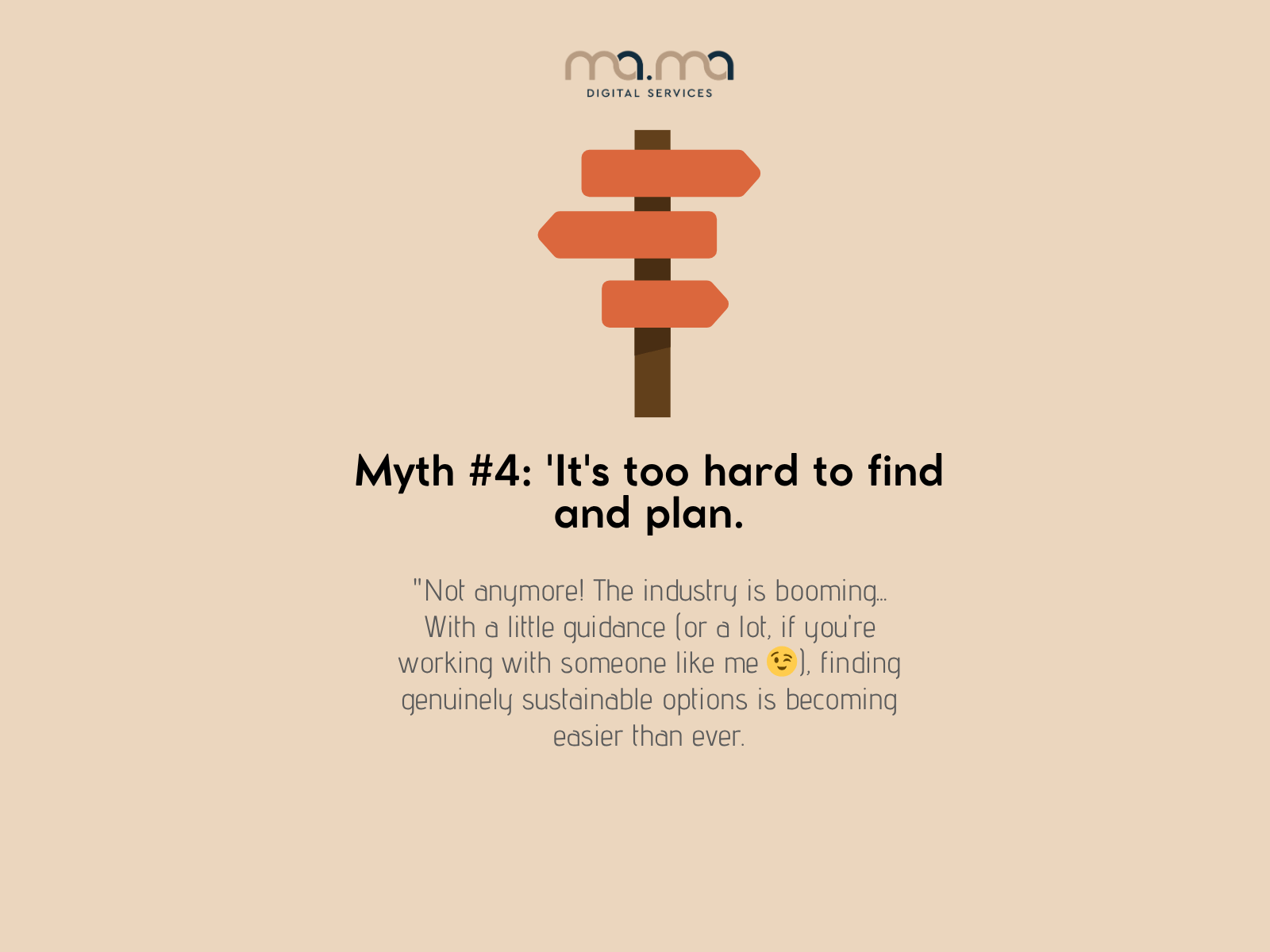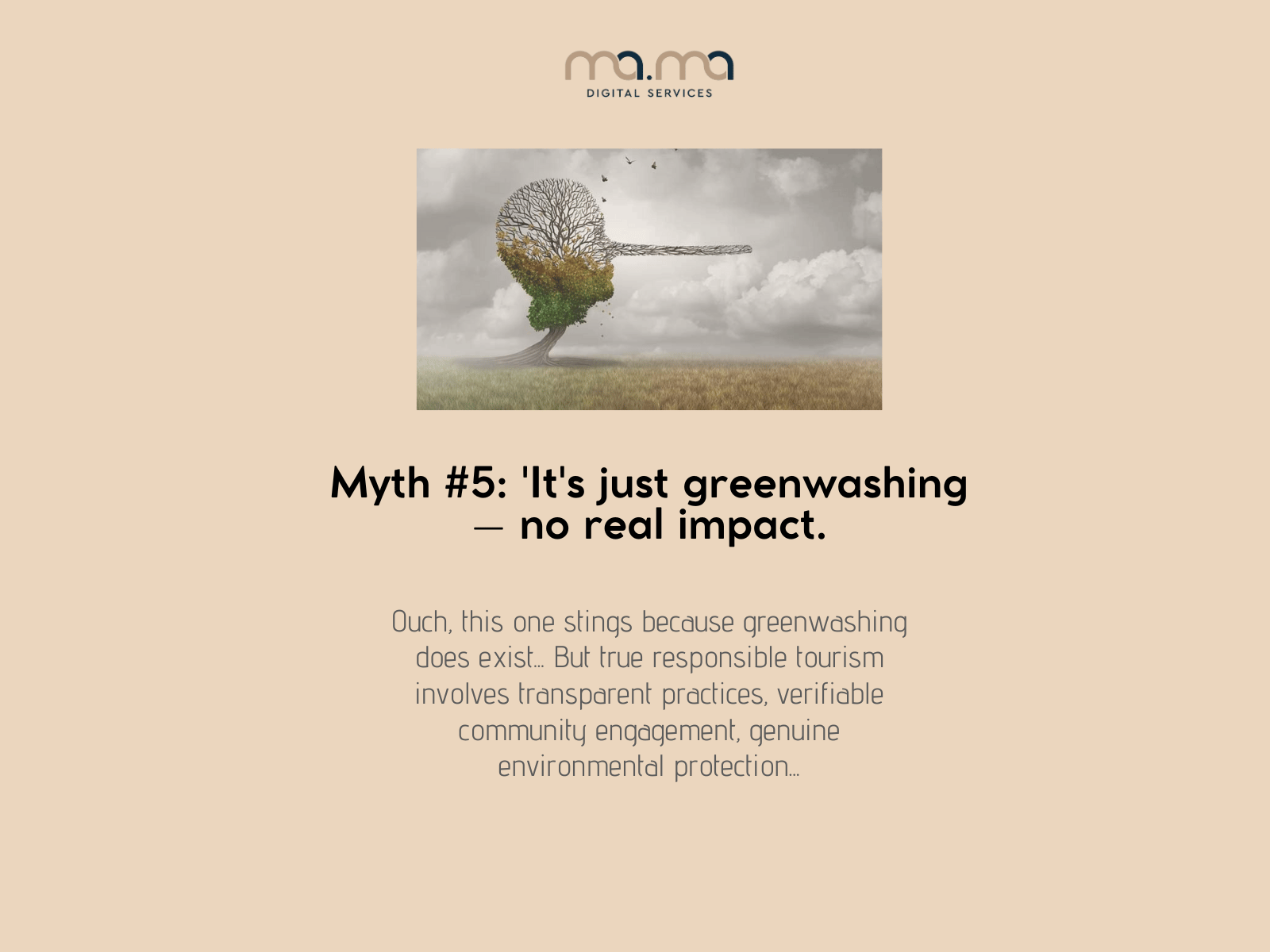The 5 biggest myths about Responsible tourism
Have you ever heard someone laugh at the idea of "Responsible tourism" and roll their eyes as if it's just another passing trend for hippies? Or maybe they imagine a holiday without any fun, comfort, and – heaven forbid – a decent cocktail? They might even dismiss it as just another form of "irresponsible tourism" dressed up in green.
Hold my (reusable) coffee, folks, because we need to talk!
I live and breathe the travel and hospitality industry, helping businesses like yours craft compelling stories, attract the right audience, and grow sustainably. I've heard my fair share of whispers, doubts, and misconceptions about Responsible tourism and Sustainable travel. It's a topic that's often misunderstood, sometimes misrepresented on purpose, and almost always underestimated.
But here's the truth: Responsible tourism isn't just a buzzword; it's the future of travel. It's about more than just hugging trees (though we love a good tree hug!). It's all about creating meaningful experiences for travellers, fostering genuine connections with local communities, and preserving our planet's precious resources. The end goal is to build a more resilient, ethical tourism industry. That's why Responsible tourism is important – it's about having a positive impact, not just making money.
The problem? There are a lot of myths about it, which make it seem like there's more to it than there really is. These myths are stopping forward-thinking travel and hospitality businesses from embracing a model that could unlock incredible growth, brand loyalty, and a genuinely positive impact. They also add to the idea that there are "myths about tourism" in general, and this stops us from making progress.
So, get ready! We're about to set off on a mission to debunk some of the myths out there. My mission today is to shine a light on the reality of Responsible, Slow, and Experiential tourism, and debunk five of the most stubborn misconceptions that might be holding you (and your business) back. We'll look at what responsible tourism is all about and how to make sure that Sustainable tourism is really making a positive difference.
Read also: What will travel be like in the future? Your guide to Slow and Experiential growth
Myth #1: "Responsible tourism is always more expensive."
Ah, the classic budget bogeyman! This is probably the most common misconception, often spread by people who think "responsible" means "boutique eco-lodge that costs more than my car". And while you can find some really luxurious and high-end sustainable options (we'll get to luxury later!), the idea that responsible travel is always more expensive is, frankly, nonsense.
Reality Check: let's take a look. People often compare a package deal at a big resort with a small-group eco-tour, and get the wrong idea. But that's like comparing apples to... well, genetically modified, mass-produced apples.
Responsible tourism is often all about supporting local economies, community-based projects, and providing genuine experiences. So, what does this mean for your wallet?
Local is often leaner: if you're looking to get the most out of your money, you should definitely consider staying in locally-owned guesthouses, eating at family-run restaurants, and buying directly from local artisans. You're cutting out the middleman, avoiding inflated prices of international chains, and directly supporting the people who live and work in your destination. Think vibrant street food markets instead of sterile hotel buffets – often cheaper, always more delicious, and definitely more authentic. These are often the heart of really responsible tours.
Value over volume: Responsible travel isn't about seeing as many sights as possible; it's about having a deeper experience over a wider one. This often means spending more time in fewer places, which reduces travel costs and lets you really immerse yourself. You might spend less on flights and more on experiences that really enrich your life.
Making smart choices and spending wisely: many responsible tourists are looking for ways to reduce their impact, which can also save them money. Things like using public transport, walking or cycling instead of taking a taxi, or refilling water bottles instead of buying plastic ones, and choosing experiences that don't involve exploitative animal tourism – these are all choices that fit with ethics and economics.
Investing in experience, not Just consumption: rather than spending on endless souvenirs or high-end retail, responsible travellers often choose unique activities, workshops, or guided tours that connect them with local culture and nature. These experiences often offer way more value and lasting memories than buying stuff.
Here are some tips for your business: don't fall for this myth – it's not true. Let's talk about the value proposition of your responsible tours and offerings. Talk about the authentic experiences, community connection and long-term positive impact of their spending. Show them that "responsible" doesn't mean "expensive", but rather "smart investment in a better trip and a better world". It's all about changing the story from cost to conscious value, showing the real benefits of Sustainable tourism.
Check this one too: The power of storytelling in travel marketing
Myth #2: "It means sacrificing luxury and comfort."
When you think of this myth, you probably imagine images of roughing it in a tent, cold showers and basic, functional accommodation. It's like, if you want to be "responsible", you've got to give up all the fun stuff. And let's be real, who's got it in them to swap a cosy robe for a scratchy one, or a fancy meal for a bowl of lentils, just to feel good about it? This often leads to people making irresponsible travel choices, putting short-term comfort before the real impact.
Reality check: let's be clear: Responsible tourism doesn't mean feeling uncomfortable or deprived. Actually, it often redefines luxury, taking it beyond gold taps and thread counts to something much more meaningful: experiential luxury.
So, what does this new luxury look like? Here are some examples of Sustainable tourism:
Unique and authentic settings: picture this: you wake up in a lovely eco-lodge in the Costa Rican rainforest, with stunning views and the sounds of exotic birds as your alarm. Or maybe a restored historic riad in Marrakech, offering personalised service and a deep dive into local culture. These are not just any old hotel rooms; they're experiences in themselves, designed to blend in with their surroundings and offer a unique authenticity. This is the perfect example of Eco tourism at its best.
Peace of mind: when you travel, it's great to know that your choices are doing some good. It's really nice to sleep soundly knowing that your stay is helping to support local jobs, reduce the environmental impact and respect cultural heritage. It's a comfort that money can't always buy. This "guilt-free" luxury is a big draw for today's Conscious tourism traveller.
Personalised and exclusive experiences: many Responsible tourism operators focus on unique, personal experiences that you just can't get with mass tourism. Imagine private guided nature walks, cooking classes with local families, or exclusive access to cultural sites – these are way more luxurious than fighting your way through crowds at a tourist trap.
Sustainable design & innovation: the latest in Sustainable hospitality is all about stunning architecture, cutting-edge green technologies and locally sourced materials. This creates a unique look and feel, and a deep connection to the area. These aren't just random sacrifices; they're actually design statements that make the guest experience better. Even areas like Cruise sustainability are seeing new designs and improvements for guests.
Wellness & rejuvenation: lots of places that care about their customers offer wellness as a key part of what they do, from food that's locally sourced and healthy to yoga retreats and getting back to nature. This focus on holistic well-being is a kind of luxury that really speaks to modern travellers who are looking to recharge and reconnect.
Here are some tips for your business: think outside the box when it comes to what luxury means. Promote your Responsible travel offerings as an upgrade, not a compromise, to a more meaningful, authentic and uniquely comfortable experience. Show off the stunning aesthetics, the personalised service, the peace of mind and the deep connection to place that your responsible practices enable. It's about selling a more luxurious and meaningful kind of experience that's also in line with the ideas of Sustainable tourism.
This is also valuable to read: The art of unrushing: SEO strategies for Slow & Experiential travel brands
Myth #3: "It's only for tree-hugging backpackers."
This myth paints responsible travellers with a very narrow brush: young, budget-conscious, probably wearing Birkenstocks, and exclusively interested in volunteering or roughing it in the wilderness. While backpackers do play a role in Responsible travel, this stereotype couldn't be further from the truth. It doesn't seem to consider the many different types of Sustainable tourism out there.
Reality check: just so you know, Responsible tourism is for everyone! We've got everyone here, from families to couples, solo adventurers, luxury seekers, business travellers and retirees. The movement is growing because people from all walks of life are craving more meaningful and impactful travel experiences. This shows why Sustainable tourism is important for the whole industry.
Here's why this myth is outdated:
A shift in values: the global consciousness is evolving. More and more people, regardless of age or income bracket, are concerned about climate change, social justice, and Ethical tourism. This translates directly into their travel choices. They want their vacations to align with their values, not contradict them.
Diverse motivations & types of Sustainable tourism:
Families: seek educational experiences for their children, opportunities to give back, and safe, authentic cultural encounters.
Couples: desire romantic getaways that offer unique experiences, privacy, and the chance to connect with nature or local culture.
Luxury travellers: as discussed, they're seeking "Conscious tourism" – exclusive experiences that are also ethical and sustainable.
Business travellers: increasingly looking for hotels with strong CSR (Corporate Social Responsibility) policies and opportunities to engage in local community projects during their trips.
Retirees: often have more time and disposable income, seeking slower, deeper cultural immersion and opportunities to contribute positively. This also includes Social tourism, which focuses on providing travel opportunities to disadvantaged groups.
Accessibility & variety: the Responsible tourism sector has really grown up. There are now options for everyone, no matter what their budget, comfort level or interests – from high-end eco-resorts to community homestays, wildlife conservation tours (a key part of ecotourism) and cultural immersion workshops. You don't have to choose between a five-star hotel and a volunteer hostel; there's a whole spectrum in between.
"Slow travel" appeal: the rise of #SlowTravel, where people stay longer, really get to know a place and take it easy, is something a lot of people are into. They're sick of rushed, superficial trips. This often goes hand-in-hand with responsible choices.
Here are some tips for your business: don't limit your target audience. It's important to remember that the desire for Responsible travel is something that people of all ages and backgrounds share. Your marketing should reflect this. Showcase how your Responsible tourism offerings cater for different travel styles and needs, from families seeking an educational adventure to couples looking for a romantic, eco-conscious escape. Your grandma could be a responsible tourist, and probably is, if she's buying local crafts!
Have a look at that: Embracing Slow living & Slow tourism in a fast-paced world
Myth #4: "It's too hard to find and plan."
"Where do I even start? How can I tell if a place is really responsible? It just seems like so much extra work!" These are common complaints from travellers who are overwhelmed by choice and suspicious of greenwashing. In the past, it was hard to find options that were actually responsible. But times, my friends, are changing. So, the question of "how to achieve Sustainable tourism" is becoming easier to answer.
Reality Check: you still need to know what you're doing, but the landscape for finding and planning Responsible travel has changed a lot. The industry is booming with incredible resources and dedicated operators.
Here's why it's getting easier (and how to be a responsible tourist):
Specialized platforms & directories: websites like BookDifferent, Responsible Travel, and Green Pearls are dedicated to listing certified or vetted sustainable accommodations and tours. These platforms do the heavy lifting for travellers, curating options that meet specific environmental and social criteria.
Certifications & labels: while not perfect, certifications like Green Globe, EarthCheck, and GSTC (Global Sustainable Tourism Council) provide a framework for businesses to adhere to and for travellers to look for. These labels offer a level of assurance that an operation is committed to Sustainable tourism.
Transparent operators: more and more tour operators and accommodations are openly sharing their sustainability policies, community engagement projects, and environmental initiatives on their websites. This transparency empowers travellers to make informed decisions and helps them understand the characteristics of Responsible tourism.
Social media & influencers: the rise of Conscious tourism influencers and online communities means travellers can easily find recommendations, reviews, and insights from others who prioritize responsible choices.
The Power of Search: with the right keywords, travellers can increasingly find responsible options through standard search engines. For example, "eco-resort [destination]" or "community tourism [country]" will yield far more results today than five years ago. This is also how you find a great Eco tourism trip.
Here are some tips for your business: this is a golden opportunity for you to shine! If you're in travel or hospitality, you've got to make it easy for travellers to find and understand your Responsible tourism offerings. So, this means:
SEO content: optimise your website with keywords related to Responsible, Sustainable, Slow, and Experiential tourism/travel. Create blog posts (like this one!) that educate and inform on how to promote Sustainable tourism.
Clear messaging: articulate your responsible practices clearly and transparently on your website, social media, and marketing materials.
Show, don't just tell: use photos and videos to illustrate your commitment – show your local staff, your sustainable operations, your community projects.
Digital advertising: target Conscious tourism travellers with ads that highlight your unique responsible value proposition.
This is where my services come in. I help businesses like yours cut through the noise, craft compelling narratives, and use smart digital strategies to connect with the growing market of conscious travellers. You just need to know where to look, and how to spot the real deals from the fakes.
Read that too: Serving up authenticity: digital ads that attract conscious travellers
Myth #5: "It's just greenwashing – no real impact."
This is the most cynical myth there is, and it's also the most damaging, because it undermines real efforts. Greenwashing – when a company makes false claims about its environmental or social responsibility – is a real problem. It makes people lose trust and makes travellers (and businesses) doubtful. But saying the whole movement is wrong just because of a few bad apples is like saying all apples are rotten. This is where the difference between genuine Responsible tourism and Sustainable tourism (often used interchangeably but with subtle differences in focus) and just paying lip service becomes critical.
Reality check: well, this one's a bit of a shocker, but greenwashing is definitely a thing. It's the slick marketing campaign that boasts about "eco-friendly" practices while doing little to actually reduce impact, or the resort that plants a few trees while still exploiting local labour. It's frustrating, and it makes people question how genuine any responsible claims are, which in turn makes them cynical about Ethical tourism.
But Responsible tourism, when it's done right, can have a huge and positive impact. It follows a few basic rules:
Environmental preservation: from reducing waste and conserving water to protecting biodiversity and supporting renewable energy, authentic Responsible tourism actively works to minimize its ecological footprint and even regenerate natural environments. This is a cornerstone of Ecotourism and Responsible tourism.
Community empowerment: this is where Responsible tourism truly shines. It means fair wages, local employment, support for local businesses, respect for cultural heritage, and direct investment in community projects (schools, healthcare, infrastructure). It's about ensuring that tourism benefits the people who live in the destination, not just external corporations.
Cultural exchange & preservation: Responsible tourism fosters respectful interactions between travellers and locals, promoting understanding and appreciation of diverse cultures. It can also provide economic incentives for communities to preserve their traditions, arts, and historic sites. This is a key characteristic of Responsible tourism.
Economic development: by keeping tourist money within the local economy, Responsible tourism creates sustainable livelihoods, reduces poverty, and builds economic resilience in destinations that might otherwise be vulnerable. This is a core benefit of Sustainable tourism.
Traveller education & awareness: when done right, Responsible tourism educates travellers about local issues, environmental challenges, and cultural nuances, turning them into more responsible tourists and conscious global citizens.
How to spot the real deal (and avoid greenwashing/irresponsible travel):
Transparency: look for detailed reports, specific initiatives, and measurable outcomes, not just vague statements.
Certifications: while not fool proof, reputable certifications (like those mentioned in Myth #4) indicate external auditing and adherence to standards for Sustainable tourism.
Community involvement: does the business actively engage with and benefit local communities? Are local people in leadership roles?
Third-party reviews: what are other travellers saying, especially those who prioritise Responsible travel?
Consistency: do their claims align across all their communications and operations? Be wary of companies promoting irresponsible travel practices.
Here are some tips for your business: being real is your superpower. Don't just say you're responsible; be responsible, and then show it. Make sure you keep track of what you're doing, share your stories and be open about what's going well and what's not so much. If you want to build a tourism brand that's really responsible, it's not just about being ethical. It's about building deep trust and loyalty with your audience, and that's what sets you apart from those who just greenwash. This is what Sustainable tourism is all about.
The future is responsible: are you ready to lead?
So, there you have it! Five stubborn myths, thoroughly debunked. Responsible tourism is not just a passing trend; it is the future of travel. It's not about sacrifice, but about richer experiences. It's not just for a niche group — it's for everyone, showcasing the variety of Sustainable tourism options available. Responsible tourism is not hard to find, but it does require smart marketing. And it's not just greenwashing; when done right, it's a powerful force for positive change. This is why Sustainable tourism is important for everyone.
For businesses in the travel and hospitality sector, adopting responsible practices is not only beneficial for the planet and local communities, but also for your bottom line. Conscious travellers are a growing, loyal and often higher-value market segment. They actively seek out businesses that align with their values and are willing to pay for authentic, impactful experiences. This is an excellent way to promote Sustainable tourism.
Are you ready to embed Responsible travel practices into your brand story? Would you like to create compelling SEO content that attracts these clients? Would you like to implement smart digital advertising strategies that demonstrate your genuine commitment and promote sustainable growth?
If so, let's chat! My services are designed to help travel and hospitality businesses like yours thrive in this exciting new era of responsible tourism, not just survive. Together, we can build your brand, attract your ideal clients and make a real difference.







